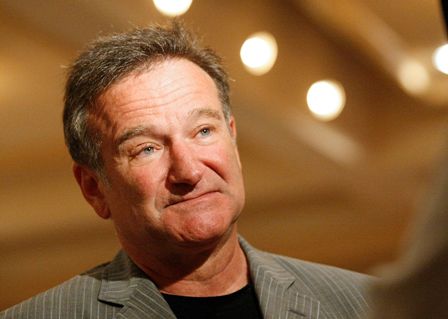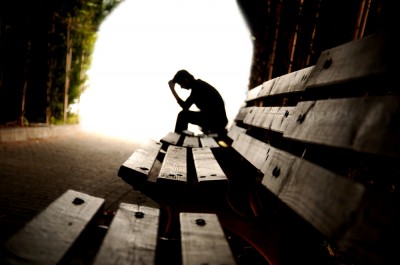I tend to not be topical in my blog posts…I figure the news and the worldly “stuff’ is not particularly my task here (I leave that for my Twitter feed, where I actually do engage in plenty of it).
Also, I was tucked away in the cocoon of a virtual news “brown out” during the death of Robin Williams, at my husbands’ family reunion, where we only heard the news when one of our midst flew in a few days late to join us on that fateful Monday evening.
So, home now, settling in, returning reluctantly to the so-called-real-world, so much has already been written, said about the sad suicide, the mental illness, and this man who was apparently not just brilliant but kind and so generous. What more, then, could I add to this conversation?
I felt at first: nothing. But an inner prompting won’t let me quite leave it alone.
There are the abounding stories about Robin Williams—his character, kindness, generosity, his surprising acts of spontaneous giving. Some of the most affecting things I’ve read have been, however, about his illness of manic depression. While I don’t suffer the manic aspect, I too well know—even with all my healing skills for others, my coterie of talented healer friends and professionals, and spiritual affinities—how daunting the illness of depression is. Whether genetics, samskara, an extension of my innate psychic sensitivity, or a mix of all the above and/or other unknown factors, this is something I have battled since childhood myself (and I must say that in many “New Age” circles, having any illness is frowned upon, but this merits whole different blog post I should consider for another time!).
 So I can’t help thinking—hoping—that this highly public suicide will open the public conversation on depression. From what I’ve seen, indeed this is happening. Much of humanity goes through difficult times—loss of love, loss of job, health, home or identity, empty nest…and suffers times of depression—sometimes severe enough to warrant medication and/or therapy—through circumstances.
So I can’t help thinking—hoping—that this highly public suicide will open the public conversation on depression. From what I’ve seen, indeed this is happening. Much of humanity goes through difficult times—loss of love, loss of job, health, home or identity, empty nest…and suffers times of depression—sometimes severe enough to warrant medication and/or therapy—through circumstances.
But how very highly unfortunate, I have felt for decades, that such “depression” has the same name as the biological illness. In periods where my own illness was more intense, I have had close friends at times ask me quizzically why I am depressed. Wondering why I would “feel so badly” when I have a beautiful enduring love in my life, a roof over my head, great friends, a meaningful profession, and live in a place that is often called “paradise” by us residents–for good reason. This question always stuns me. As well as they know, love, and accept me, they don’t get it. No one gets it, I suppose, unless one is medically or psychologically trained, knows someone intimately, or yourself have this illness which strips all meaning, all self-worth, all Light from one’s sense of soul.
In the wake of Mr. William’s passing I was reminded of one incident about him. It was a second-hand perception given to me by an unusual source. Once at an Esalen Institute workshop, the groundskeeper sat at lunch with my workshop cohorts and myself. He had been there 30 years, seeing all manner of amazing teachers and attendees from Grateful Dead members to enlightened masters to clown workshops to tantric masters. While he did not attend many of the workshops in full, he often got a taste of many, or at the least got to meet workshop leaders and students as they sat at the group meals or attended other activities on the property.

What an interesting opportunity, I mused, to query him as to the luminaries that he found most memorable.
“Eckhardt Tolle was amazing. Such a profound silence around that man, such pristine clarity. And I loved Byron Katie also! There was something unique and transformative about her energy field.”
“Anyone else?” I wondered aloud.
“Robin Williams was here one time. He was quite possibly the least relaxed person I’ve ever seen at Esalen. He was always ‘on.’ He could not just let down his hair and be himself, even here in this place of authenticity. I admire him but that really was striking to me. He seemed so very uncomfortable.”
Now that we know of Robin William’s great, immense struggle to “be himself,”—neither too up and manic nor too down and hopeless, this makes a new kind of sense. Many depressives (& I imagine possibly for manic depressives even more so) go through heart-wrenching internal battles to feel their ‘center,’ a place of quiet, rooted stability and serenity within. For years I felt that Robin William’s true genius was not just in his comedy (often a bit too manic for my taste—perhaps I sensed his mania behind the clowning?)—but in his deep, deft dramatic portrayals. It seems clear he knew the depths all too well, and could play to those depths. And of course he could also be in his genius-stream-of-consciousness comedic place readily.
But to be “himself,” in his own restful healing centered place? From what I have read only just this week, he was able to, at times, be just himself—with his family in particular. But dancing as fast as he could, trying to find a central place from which to meet himself, and then the world, was tragically, apparently (we can’t ever know for sure his precise inner experience) not readily available.

Let us hope that such illnesses will be more recognized; the dialogue opened up about mental health as a health issue, not an issue of circumstance, morals, attitude, or beliefs. And that more effective treatments are sought and prioritized as the man who was Robin Williams now gifts us this opportunity as he finds, we trust, a more restful place for his own soul.
I think this tribute to Robin Willians and your discussion of his struggle is absolutely beautiful…respectful, resonant, and thought provoking. I also deeply appreciate your own self-disclosure-what a brave and loving gesture. I hope that in your sharing both you and your readers feel a bit more validated, understood, and acknowledged for your struggles and suffering. I also hope, as you do, that the world becomes more sensitive to the challenges of people that suffer with biological depression. Thank you for sharing!
Ali, thank you so much for the thoughtful and quite beautiful reply. I appreciate your taking the time to read it and respond, and appreciate that this issue touched you.
I agree with Ali, a very well written piece (that I am >finally< getting around to reading after having had the tab open for over a month!). My cousin killed himself a few years back, a brilliant man (Masters degrees both in Business and Creative Writing), but just never did measure up to his own expectations, I guess. Several of his friends put their lives on hold and immediately drove from hundreds of miles away to be at his memorial. Heartbreaking, because you know they would have much rather done that to help him stay alive. But there's Depression for you, you just can't see that, because the disease tells you just the opposite. So insidious and heartwrenching and dispiriting.
Someone just the other day asked me (rhetorically) how someone who had taken their own life (Williams, I think) could do that to their family. I don't remember who it was, but I remember I was surprised, because it was someone I would have expected to understand. When you are depressed to the point of suicide, you can often think that you are an awful burden on your family, and that if you were gone it would relieve a burden from them. Of course if you said that, your family would be shocked and appalled and assure you that your LOSS would be the burden. But you wouldn't believe it, and would likely never have told them anyway, because depression keeps you from asking for help. So heartbreaking.
Oh, and I'd like to see that piece on victim blaming among "New Age" communities. So many articles are written as if you should be able to cure your cancer or depression or whatever through positive thinking and avoiding allopathic medicine — and by implication, if you can't do that, you're not doing it right, your thinking is messed up, or whatever. And then you get avoided, usually unconsciously, because your "negative vibe" might be catching. Now, everyone kind of does this latter part — it's natural to be sort of superstitious and to subconsciously feel like bad things might be catching. But the New Age movement so often explicitly says that you can heal yourself, and by implication, if you can't, it must be your fault.
Andrea,
First of all, I am very sorry for your tragic loss. This very public suicide must have certainly restimulated your own grief.
And I just want to thank you for such a very thoughtful and articulate reply. It’s hard to measure the ripples and impacts of this tragedy, but clearly it has had the one positive effect of raising some consciousness around this issue.
Blessings and thank you again for taking the time here.